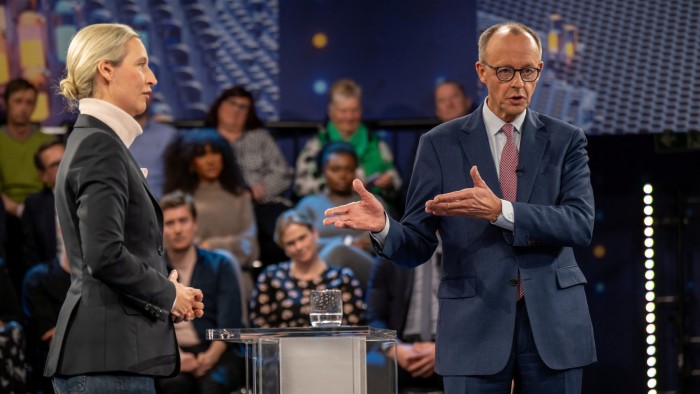Unlock the Editor’s Digest for free
Roula Khalaf, Editor of the FT, selects her favourite stories in this weekly newsletter.
Germans vote today in an election that is set to give the far-right Alternative for Germany (AfD) its highest result and determine the future of Europe’s largest democracy at a time of acute geopolitical and economic challenges.
Polls have suggested that the pro-Russia, anti-immigration party co-led by Alice Weidel could win the support of about one in five German voters, double what it achieved in the 2021 federal elections. During the campaign the AfD received the backing of the Trump administration and Elon Musk, the world’s richest man and owner of X.
The party’s electoral gains would mark a shift to the right in the Eurozone’s largest economy, which has struggled for the past two years due to high energy prices and competition from cheap Chinese imports.
The first projections of seats in the Bundestag will be released at 6pm local time, when polling stations close.
The AfD’s xenophobic campaign struck a chord after three deadly attacks carried out by migrants. On Friday, police said they had arrested a Syrian refugee over a suspected knife attack at Berlin’s Holocaust memorial.
All the other German parties have ruled out partnering with the AfD in a coalition — a so-called firewall denounced by US vice-president JD Vance at the Munich Security Conference last week.
But a large far-right group in the Bundestag is likely to complicate coalition building efforts by Friedrich Merz, the leader of the Christian Democratic Union (CDU) who is in the lead to succeed Olaf Scholz as chancellor.
Merz’s conservative party is predicted to win the election with about 30 per cent of the vote, while Scholz is poised to lead his centre-left Social Democratic Party (SPD) to its worst defeat since 1887, with 15 per cent.
Forming a coalition could be made even harder if smaller parties such as the liberal FDP, the far-left Die Linke and the one-year-old “leftwing conservative” party established by the firebrand Sahra Wagenknecht cross the 5 per cent threshold to enter the Bundestag.
The next German chancellor will not only inherit a stagnating economy but also a country disoriented by Donald Trump’s hostile rhetoric towards Europe. The US president has shaken his transatlantic allies by threatening to withdraw security guarantees from the continent and conducting talks with Russia over the fate of Ukraine.
“We will win the federal election and then this nightmare of the current government will finally be over,” Merz told supporters at a rally in Munich on Saturday.
“Yes, we have structural problems, but for me the glass is always half full and never completely empty,” he added. “We are going to turn this half full glass into a full glass again and we are going to show what this economy can achieve.”
Read the full article here




